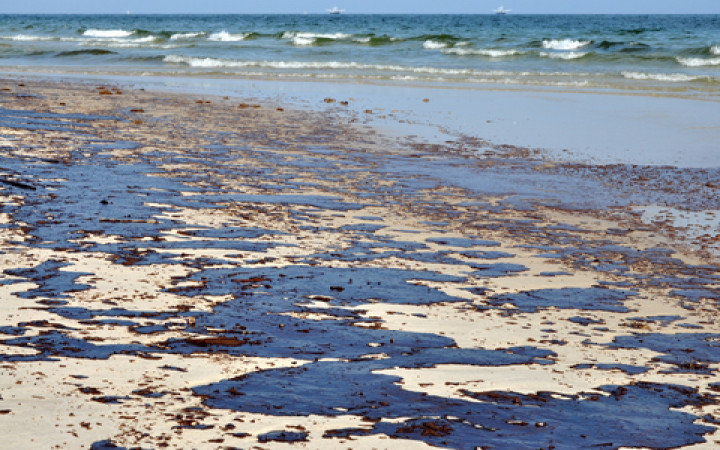Today’s Wonder of the Day was inspired by Kaitlin. Kaitlin Wonders, “How is an oil spill cleaned up?” Thanks for WONDERing with us, Kaitlin!
Have you ever seen someone pour olive oil in a pot of water before cooking pasta, or bath oil into a tub before taking a long soak? If so, you may have noticed that the oil seems to float on the water. It doesn’t mix in with the water; it stays separate. What would you do if you were asked to take the oil out of the water? Could you do it?
You’ll probably never need to take cooking oil out of a pot of water. But removing oil from water is a real-life problem! It happens like this. We all use oil for many things, from gasoline for our cars, to making plastic toys. Oil is usually found deep under the Earth. Large machines drill far down and extract the oil. Oil isn’t found everywhere—only in certain places. Therefore, oil may have to be moved long distances before we can use it.
Sometimes oil is transported on oil tankers, large ships that can carry huge amounts of oil across the ocean. Other times, oil might flow through a pipeline from one place to another, in a similar way that water flows through pipes to our homes. Either way, leaks can happen. Oil tankers may wreck or run aground; pipelines may break. When this happens, oil can leak out of its container. This is called an oil spill.
Oil spills can happen on land or in water. Some of the most destructive oil spills have happened in water. This makes sense, because spills on water are more difficult to clean up! Oil can be very harmful to animals that live in or near the water.
Oil can harm animals in several different ways. For animals with fur, like sea otters, the oil makes their fur less insulating. They can then become too cold. The same can happen with birds. The oil makes their feathers less water repellent, so they can either get too hot or too cold. If birds or other animals swallow oil, it can make them sick. Fish and shellfish can get sick from the oil, too. When oily fish or shellfish get eaten by other animals, it can make the other animals sick as well. Fish that have been around oil are not safe for humans to eat, either.
When an oil spill happens, many people work together to try to clean it up as best as they can. Let’s think back to our olive oil in a pot of water. If you accidentally poured too much oil into the pot, how could you get it out? There are several ways that can work. One way is by using a physical to prevent the oil from getting onto certain places. This is called a boom. A boom can sometimes keep oil contained. It can also be used to protect important places, like bird or sea turtle nesting grounds, from oil.
Another method is skimming, or scooping, oil from the water. There are some different devices that do this work. Unfortunately, this does not always work. It depends on how much oil is in the water and how thick the layer of oil is.
These first two methods are the safest for people and animals near the oil spill. But when they do not work, we use other ways to help clean the oil. One is to burn off some of the oil. When there is a lot of oil floating right on top of the water, we can burn it while it’s still floating on the water. Another way is to use chemicals that work like soap. These turn the oil into many much smaller pieces. You have seen this work when we use soap to clean greasy dishes!
No one wants oil spills to happen. But when they do, scientists are able to learn from their efforts to clean up oil. They are always working to find new ways to clean up oil spills. Some are now using robots to find and absorb oil. Others are using sponges to soak up large amounts of oil.
Even with all of these new ideas, we do not yet have a way to clean oil spills completely. What do you think? Do YOU have an idea that could help?
Standards: CCRA.R.1, CCRA.R.2, CCRA.R.6, CCRA.R.7, CCRA.R.8, CCRA.R.9, CCRA.R.10, CCRA.L.1, CCRA.L.3, CCRA.L.4, CCRA.L.5, CCRA.L.6, CCRA.W.1, CCRA.W.4, ETS1.A, ETS1.B, ESS3.B, ESS3.C




